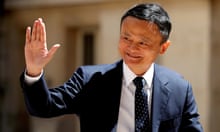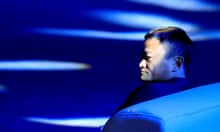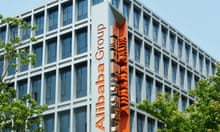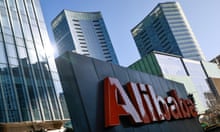Braving an ominously grey sky, Ine Brants, 33, perches precariously at the top of a stepladder at Liège airport’s perimeter fence. “Ah, the green queen,” she says, raising the long lens of her camera to Challenge Airlines’ green-liveried jumbo jet as it flies into view. “You can get a 747 rush hour here. It has definitely got busier since coronavirus.”
Brants’ lens is capturing the Alibaba effect. Quietly over the last three years, Liège, Belgium’s third largest city, has been transformed into a launchpad for the Chinese e-commerce group’s push into the European marketplace, a dynamic boosted by the coronavirus pandemic. It is a cause for celebration for some and worry for others.
There is no trace of Alibaba branding at the airport, from the empty passenger arrival and departure halls shut owing to the health crisis, to the loose-gravelled lorry park where Brants and other plane spotters shuffle in the cold.
But follow the perimeter fence around the two runways, past the vast orange TNT warehouses and customs offices and on to the south side, where the airport meets the little village of Velroux, and there, in front of a some tall heaps of sandy soil and pallets of corrugated iron, is a sign bearing an architect’s drawing of a large grey building and the words “Alibaba Smart Hub Belgium”.
The Chinese are coming. By the summer, this muddy plot in the Francophone municipality of Grâce-Hollogne in south-east Belgium will boast a cargo building covering 33,000 sq metres (355,209 sq ft) as part of a €300m (£262m) investment by the Alibaba subsidiary Cainiao Smart Logistics Network.
Alibaba has also established in partnership with the company ZIH a rail link between here and Zhengzhou in central China, connecting two cities nearly 5,600 miles (9,000km) apart, twice a week. Local logistics companies are being recruited to move the goods onwards.

The development promises a new chapter for this once proud steel-producing area as Alibaba’s European hub, handling more than 80% of parcels purchased through its international online platform AliExpress, a kind of broker that allows businesses around the world to offer their services through one website.
Liège is the frontline of a push into Europe that seeks to challenge Amazon in one of the world’s wealthiest markets and provide a whole new array of services not offered by Alibaba’s US rival.
Deliveries from China first started arriving in large numbers after the Belgian state deployed the services of King Philippe to encourage Alibaba’s co-founder Jack Ma to choose Liège as its European base during multiple royal audiences in 2018.

But Michel Kempeneers, of the Wallonia Export Investment Agency, said the pandemic had since triggered an “enormous leap in the awareness of [Belgium] shopkeepers” about the opportunity to sell goods to the Chinese market through Alibaba. “A leap of five years in five weeks, some experts say,” headded.
In turn there has been a notable surge in deliveries arriving in Liège from Chinese sellers. During Alibaba’s Double 11 shopping festival in November – an online promotion month much like Black Friday – record amounts were flown in.
“On average there were two to three cargo flights arriving in Liège from 13 November to 6 December, which represent an estimated 200-300 tonnes of cargo each day during those days,” Kempeneers said. The number of packages transported via Liège airport has increased from 9m in 2018 to more than 500m last year.
Beyond the impact of the global increase in online shopping during the crisis, the airport, which operates 24/7, has benefited in recent months from the rising cost of transporting goods by sea from Asia, said Tiffany Lung, an independent retail analyst based in Hong Kong.
A lack of empty containers available in China – many were left stranded in Europe and the US when shipping lanes cancelled trips at the start of the pandemic – has quadrupled prices on sea trade routes to Europe.
“Speed within the western region is the only thing Amazon has an upper hand with against Alibaba, but this is also why Alibaba has been strenuously investing in building up a global logistics hub,” Lung said. “Supposedly with their new freight route, items from China can arrive in Europe quickest within three days, cutting the industry average by a third.”
And yet far from everyone is happy. “There is already deafening noise,” said François Schreuer, a councillor for the local Green party in Liège and a founding member of the Watching Alibaba campaign group.
For all that Alibaba is offering jobs, a series of protests have been staged over the last 18 months in Liège’s city centre. Some of the complaints – about air pollution, the clogging up of the arterial roads and night-time flyovers – are perhaps predictable. But there is also a deeper anxiety voiced about the city’s future.
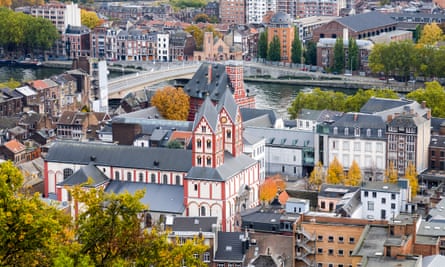
Too much reliance is being put on Alibaba to revive the fortunes of the region, which has struggled to find a new way since the collapse of heavy industry in the 1960s, those behind Watching Alibaba say. “Logistics is becoming a new monoculture,” said Schreuer.
FedEx announced last month it was initiating a collective dismissal procedure with regard to nearly 700 workers at Liège airport as it wished to move operations to Paris. It has been suggested that the logistics company was upset by Alibaba’s move, a claim denied. But for many, it remains a sign that the region is putting too much reliance on foreign companies that have little local attachment.

“This episode sadly confirms what we have been repeating for years: we cannot build, in the long term, the development of a region on an economic sector as little anchored locally, as easily delocalised, as international logistics,” said Watching Alibaba.
Alibaba reported record revenues last quarter of £24.6bn – up 37% year on year. But Ma’s three-month disappearance after criticising the Chinese Communist party has raised fresh concerns over whether Alibaba is truly to be banked upon.
Kempeneers concedes there is no certainty that Alibaba’s push into Europe will be a success. He points to the 9,000 jobs at the airport and the deployment of local companies to move the goods onwards. But it is yet to be seen whether Europeans want to buy Chinese brands in sufficient numbers. According to the lobby group Ecommerce Europe, AliExpress has just 2% to 5% of the e-commerce traffic in Europe.
“The project in Liège will depend, as with any logistics activity, on market developments and of course on the consumers,” Kempeneers said.
Climbing down from her stepladder, Brants, who lost her job during the pandemic, says she backs anything that will bring work to the area. But there is a word of warning about the challenge. “I buy stuff on Alibaba from time to time – it could be quicker,” she said. Liège’s future perhaps depends on it.

